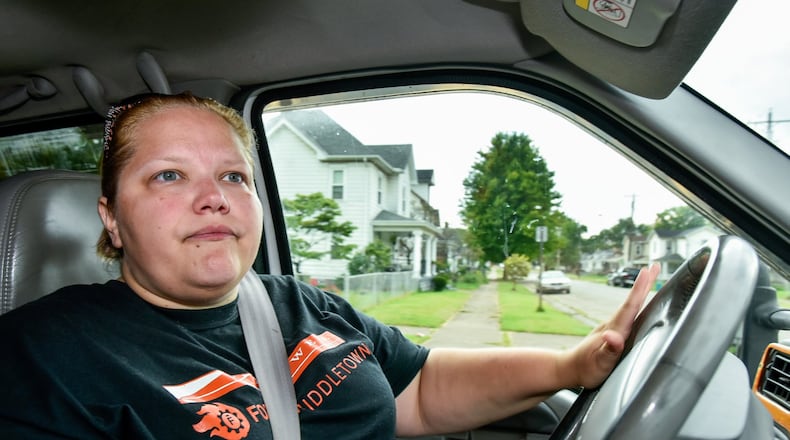MORE: Middletown o n pace to double drug overdoses from last year
Here are some of the recent efforts led by Butler County residents:
1. Middletown mom spends days helping city’s addicts
For the past six years, Jeri Lewis have driven around Middletown’s Sherman Park neighborhood where she said “some of the most loving people” live, checking on those who may be struggling with drug addiction, mental illness or prostitution.
She has been known to U-turn if she sees someone who needs assistance.
She jokingly calls the neighborhood “my beat.”
“I consider myself a missionary and this is the mission field,” she said. “We got to get outside the walls.”
Last week, Lewis and numerous volunteers finished a lunch feeding program at Sherman Park. Community members provided food to children during the summer.
Lewis compared the program to “planting seeds, watering them and seeing the harvest.”
2. Hamilton grandfather sends a clear message
A Hamilton pastor took it upon himself to became part of the conversation after seeing the way drugs were impacting his Parkamo Avenue neighborhood.
Pastor Dennis Matheny, 69, said his street was becoming known as “Heroin Alley,” so in a simple gesture he sat outside with a homemade cardboard sign that read, “No Drugs Today.”
MORE: Hamilton grandfather’s protest of ‘No Drugs Today’ draws praise
His simple act led to a rally on his street and a neighborhood meeting with Hamilton Police Chief Craig Bucheit, which led to an action plan for the Parkamo Avenue area that will include increased police patrols and a neighborhood watch program.
When meeting with the Parkamo Avenue residents earlier this month, Bucheit said: “The police can’t solve it alone and neither can the public, but working together is the most effective tool we have to fight crime.”
3. Rallying residents and addressing leaders
Trenton resident Dan Kattwinkel, 56, said he observed Matheny’s stand against drugs and it spurred him to start a movement in his community.
“I saw how that worked well and we need to have it here in Trenton because we have some problem areas and we need the police and city to work with citizens to take this on,” Kattwinkel said.
MORE: What you're saying: A grandfather's protest of 'No Drugs Today'
Kattwinkel collected statements from residents and had planned to visit a Trenton City Council meeting to voice the concerns of those “fed up with the drug stuff in the neighborhood.”
4. Two women invite 498 more to march against heroin
Middletown’s Pat Herndon, 67, and her good friend, Josephine Gates, 65, along with three women, have organized what they’re calling: “This Means War! 500 Women March Against Heroin,” scheduled for Sept. 23 in Middletown. The organizers are encouraging men and children to participate in the march that will feature four keynote speakers.
“I’m just a doer,” Herndon said. “Not talk about it.”
The goal of the march is to bring awareness to the heroin epidemic, she said.
Herndon said she has been contacted by Franklin residents about helping them organize a similar march in their city.
5. Mourning women want to help find the missing
Another battle is finding those missing, those possibly overdosed in a vacant house or alley.
When Leslie Dalton, 20, of Middletown, was missing for several days, her mother, Rebecca Charlton, and her grandmother, Sally Hollon, spent hours — sometimes searching with flashlights until 4 a.m. — looking for her.
Dalton was found earlier this week in a dried creek bed after she allegedly overdosed in a house on Wilbraham Road, then was moved to nearby woods.
RELATED: 2 charged with dumping Middletown woman’s body in woods
Charlton and Hollon have pledged to search for other missing Middletown women they suspect may have overdosed like Dalton.
“We are losing too many of our young people to this,” Hollon said. “When they’re pulling in and out you know what’s going on. Report it. That’s the only way we are going to end this. These girls who are missing need a voice. Some of them don’t have families. We beat the streets until we found Leslie.”
MORE: Mom of Middletown woman found dead in woods speaks out
Hollon encouraged residents to get involved and report possible illegal activity to the local police department.
“The only way Middletown is going to take our streets back is if we get involved,” she said. “Everybody knows that house in their neighborhood. You know that house. Put heat on it. Get them out of our town. The cops can’t do it. There aren’t enough of them. But if all of us stand as a town, we can get them out of our town.”

